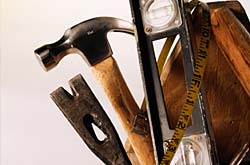New Generation of House Poor Leads to Strange Housing Conditions
See if We Have Top-Rated
Home Improvement Professionals in Your Area

The term "house poor" used to refer to homeowners who bought larger homes than they could reasonably afford, theoretically tying up a large portion of their personal wealth in their home. Unfortunately, that wealth has disappeared with the collapse of the housing market, and a new generation of house poor has been defined by home mortgages that have created substantial debt, loss of credit, and, in the worst-case scenario, homelessness. To cope with this economic reality, many homeowners are resorting to odd—and in some cases dangerous—living conditions.
Loss of Income, Declining Home Prices Create Large Households
Some divorced couples have had to remain under the same roof due to an inability to sell their house and/or establish a second residence. One couple in St. Petersburg, FL has even had to use their lawyers to negotiate which days laundry can be done. A more common phenomenon that has been around for decades, but has certainly escalated with the current recession, is recent college graduates moving back in with their parents. Companies are expected to hire 22 percent fewer grads from the class of 2009 than the class of 2008, according to the National Association for Colleges and Employers (NACE).
Renovations for Large Households
Whatever the circumstance, sometimes renovations can be necessary to allow larger households to function. Bathrooms, for example, are huge. Three and four bedroom homes with one bathroom are limited in the number of residents that can reasonably accommodate. Parents, who can't endure sharing a bedroom wall with their 20-something child, would do well to undertake a garage loft addition to create a separate living space. Finally, don't underestimate the value of smaller, targeted improvements. Sound-dampening insulation can increase a home's energy-efficiency and create an important piece of privacy for household members.
Struggling with Mortgage Payments, Homeowners Neglect Home Maintenance
As difficult as it is to keep up with escalating mortgage payments, when major home repairs are needed, homeowners are left with few options. If the previous generation of house poor lived in a residence with no utilities or furniture, today's generation can experience nothing short of running their homes into the ground. With every roof crack, leaky pipe, boarded window, or missing siding panel, a house becomes closer and closer to being declared condemned. It may sound pretty far-fetched, but residences have been condemned for less. (Here's a link to a story about one man whose apartment was condemned for having too many stacked books: http://www.earthtimes.org/articles/show/86831.html)
Indeed, the relationship between foreclosures and homes near "condemned" status is so tight that the umbrella term "distressed property" can be used to describe a home that is in poor legal OR physical condition. Imagine getting served with foreclosure papers and a condemnation notice on the same day: Along with the growing number of foreclosures, the rate of abandoned homes is also increasing. In places like East Cleveland, one in five homes is abandoned. In fact, the resurrection of the home building industry may involve a significant portion of new housing starts that occur on the lots of previously demolished homes, as the trillions of dollars claimed by the housing crisis physically manifests itself.
Tips to Avoid Costly Home Repairs
1. Water and Moisture: By far the most commonly destructive force in the home, water and/or moisture can lead to pests, mold, rot, and deterioration of any number of home furnishings. Find the source of the water, and don't give up till you've found a way to remedy the problem.
2. Cracked Walls and Door/Window Jambs: Both walls with cracks in them and doors or windows that are out of jamb can be signs that your foundation is shifting. This may not present an urgent home repair, but it must also be closely monitored. Foundations allowed to reach an extensively damaged condition can lead to total property loss.
3. Thermostat/Heating and Cooling: Few areas of the home are more likely to see a relatively easy repair become a major problem, including the expensive prospect of replacing a heating and/or cooling system. If your furnace or A/C is running continuously, isn't heating or cooling as it should, or is showing other symptoms of disrepair, turn the system off until you can afford/find someone to look at it.
4. Do as Much as You Reasonably Can: Some of the most important pieces of home maintenance are also some of the easiest. Clean your gutters twice a year, or as needed. Clean gutters will protect your roof, siding, and foundation/basement. If you can't safely clean your own gutters and can't afford to hire someone, look for a friendly neighbor who can help you out. But don't overextend yourself. Personal injury isn't going to help your finances, especially if you don't have health insurance.
Of course, basic home maintenance is the most important piece of avoiding major, expensive, and unnecessary repairs. Have your roof, in particular, inspected at least once a year, and a comprehensive home inspection isn't a bad idea, either. But for homeowners who can't afford a couple hundred dollars every few months for basic home maintenance, here are a few things to watch for.
More Tips & Advice For Your Home
- Related Articles
- Recent Articles

